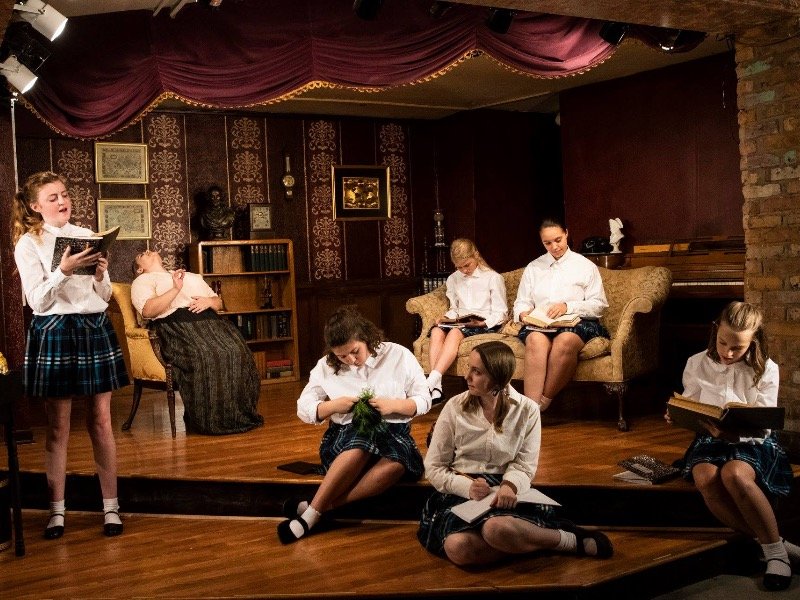There’s a rumor going around that something "unnatural" is happening at the local boarding school. There’s a girl who says she’s heard things late at night – sounds that shouldn’t be coming from the bedroom of two female teachers. And once a story like that gets out, it doesn’t much matter what the truth is.
This is the plot of "The Children’s Hour," Lillian Hellman’s classic play about scandal and the power of lies to destroy innocent people’s lives, presented by Outskirts Theatre through July 29. Performed in the tiny, 50-seat basement theater in the Brumder Mansion, a historic bed and breakfast, the production has some nice moments and good performances – when it is not overwhelmed by melodrama.
The 1934 play "The Children’s Hour" was Hellman’s first big break. After penning some mediocre romances, she thought her career as a writer was over. Then her lover and mentor Dashiell Hammett (author of "The Thin Man" and "The Maltese Falcon") suggested she take a true-crime story and turn it into a play. The incident Hellman used as source material occurred in an Edinburgh girls’ school in 1810.
A particularly unhappy student accused the headmistresses of having a sexual relationship, and the school was shut down almost immediately as parents withdrew their students from the dangerous women. The two teachers filed a slander suit, and won, but their careers were destroyed.
The play itself has had a strange journey. It was a hit on Broadway, but was denied a Pulitzer Prize due to its racy content and banned from production in Boston, Chicago and London. In the 1950s, it was revived – an attack on the House Un-American Activities Committee (HUAC) hearings, which called both Hellman and Hammett to testify.
Removed from those eras, modern audiences might see parallels to ongoing hostility against the LGBTQ community or the dangers of "fake news." In his director’s notes, Dylan K. Sladky writes that he wanted to humanize the "other" – to make the point we are all more alike than we are different and that we need to respect those we disagree with. Whatever lesson the audience comes away with, they will be treated to several fine performances that bring the early 20th century story to life, in surroundings that echo that time.
The play opens with a group of teenage girls, dressed in matching school uniforms, enduring their elocution and sewing lesson under the tutelage of an eccentric old woman, Mrs. Mortar, who once fancied herself an actress. The students, a mixture of teens and adults who can pass for younger, fidget and complain. Some cram for tests while others goof off.
It would have been a nice way to set up the story, except that sightlines were a problem – specifically, anyone not seated in the first row of chairs couldn’t see any of the actresses sitting on the floor. And with a 30-something appearance, Mortar (Brittany Boeche) comes off as shrill and mean, instead of a dotty senior citizen with old fashioned sensibilities. This severely limits the audience’s sympathy for her, which will be critical later in the play.
But in the first scene, we also meet Mary Tilford (Ashley Retzlaff), the spiteful girl who lashes out at everyone around her due to her own unhappiness at the school. Retzlaff is truly frightening as the bad seed bully, who blackmails and physically attacks her classmates and manipulates all the adults in her life with the dexterity of a sociopath.
In long French braids and glasses, she oscillates from wronged innocent to devious brat to mob boss in the blink of an eye. Her performance is focused and powerful – but also almost overwhelms the play. More subtlety would have made the character more interesting and lessened the disconnect between acts.
The other really compelling performance is Samantha Paige’s Martha, the frequently frustrated teacher whose argument with Mortar, her ridiculous widowed aunt, leads to accusations of "unnatural" behavior regarding her co-teacher Karen (Kira Renkas). Paige is forceful, but eminently likeable onstage. She also has all the best lines, cynical observations delivered with deadpan accuracy. When Paige’s strong and determined character is finally undermined by "a lie with an ounce of truth," her admission of love for her friend is truly heartbreaking.
Unfortunately it’s hard for the other cast members to keep pace with Paige – literally and figuratively. The uncertain pauses before many of the actors’ lines detracted substantially from their performances and slowed many scenes down. And the uneven cast made a lot of rookie mistakes (which should have been caught by the director) including dropping the ends of their lines, repeatedly turning their backs to the audience while speaking and clumping together in stagnant group scenes.
Sladky, however, did use most of the quirky basement theater space to his advantage, utilizing the existing staircase and doors for entrances and exits. But while audience members did catch glimpses of the girls scampering around the mansion before the performance, it feels like a missed opportunity not to incorporate more of the house – already a perfect backdrop – into the show.
Special kudos goes to the young performers in "The Children’s Hour" – Ellie Boyce, Greta Dane, KyLee Hennes, Katrina Liberman and Chance Wall – who all shined in their relatively small parts. I look forward to seeing more of them on Milwaukee stages in the future.







